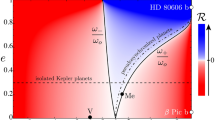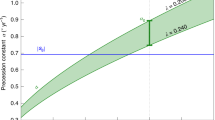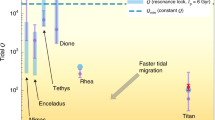Abstract
SOLAR tidal friction must be an intense effect for Mercury, and it must be expected that the planet's spin would have relaxed from any original value to one that is under the control of this effect in a time short compared with the age of the solar system. The retarding torque exerted by the Sun on a planet is proportional to 1/r6 (where r is the distance Sun-planet), a factor which is some 300 times greater for Mercury than for the Earth. For a planet on a circular orbit the final condition would then be one of synchronous rotation like the motion of the Moon with respect to the Earth. Mercury's motion around the Sun takes 88 days and for synchronous rotation the sidereal period would thus be 88 days also. The observed value of 59 ± 5 days differs markedly from this (see preceding communication).
This is a preview of subscription content, access via your institution
Access options
Subscribe to this journal
Receive 51 print issues and online access
$199.00 per year
only $3.90 per issue
Buy this article
- Purchase on Springer Link
- Instant access to full article PDF
Prices may be subject to local taxes which are calculated during checkout
Similar content being viewed by others
References
MacDonald, G. F. J., Rev. Geophys., 2, No. 3 (1964).
Author information
Authors and Affiliations
Rights and permissions
About this article
Cite this article
PEALE, S., GOLD, T. Rotation of the Planet Mercury. Nature 206, 1240–1241 (1965). https://doi.org/10.1038/2061240b0
Issue Date:
DOI: https://doi.org/10.1038/2061240b0
This article is cited by
-
Determination of Phobos’ rotational parameters by an inertial frame bundle block adjustment
Journal of Geodesy (2018)
-
Mercury’s resonant rotation from secular orbital elements
Celestial Mechanics and Dynamical Astronomy (2015)
-
On the rotation of Mercury
Celestial Mechanics (1979)
Comments
By submitting a comment you agree to abide by our Terms and Community Guidelines. If you find something abusive or that does not comply with our terms or guidelines please flag it as inappropriate.



